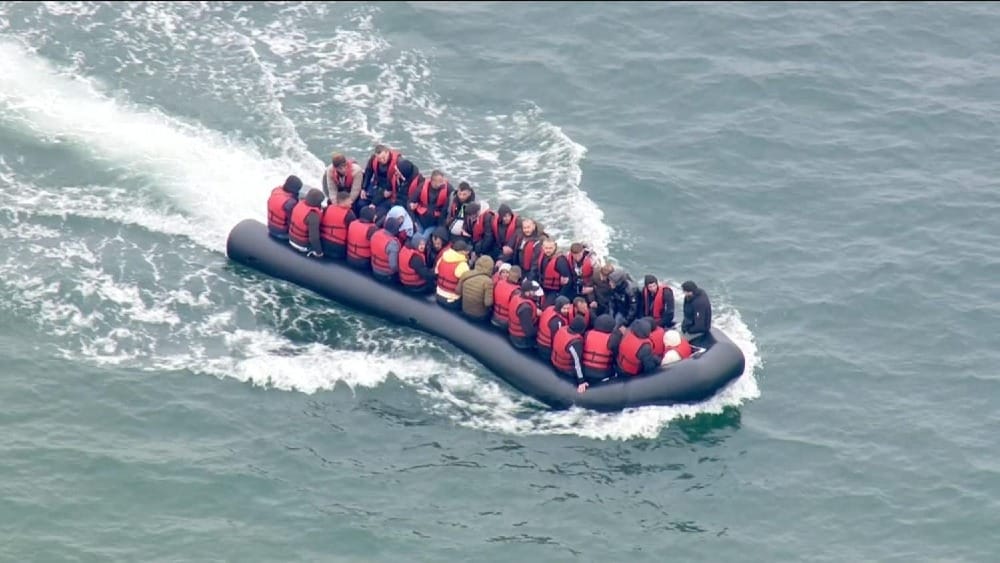How to solve the Great British Asylum Crisis
Backed by Research & Data: Delve into the intricacies of the broken Asylum system and how we can fix it with pragmatism.

The UK's asylum system has become emblematic of dysfunction, marked by financial mismanagement, conflicting legislation, and growing political discord. The system faces criticisms from both the left and the right, reflecting deep divisions in public discourse. On the right, the system is seen as porous and susceptible to abuse, particularly by economic migrants and those arriving via irregular routes such as small boats across the Channel. Conversely, the left highlights the system's lack of compassion, citing the failure to provide safe and legal routes for genuine refugees and the punitive treatment of asylum seekers.
What is an asylum seeker?
To characterise an asylum seeker, we must provide context. Often confused with illegal immigrants, asylum seekers are people who flee their country of origin as a political refugee. Because of the framework of British legislation, it is impossible for an asylum seeker, who crosses the channel on a small boat, to be deemed an illegal immigrant.
Recent years have witnessed contradictory policies exacerbating these issues. The Rwanda deportation scheme, spearheaded by Suella Braverman and initially signed off by Priti Patel in 2022, intended to deter irregular arrivals. However, it failed spectacularly, costing the UK taxpayer £715 million despite not resulting in a single deportation due to legal challenges and the European Court of Human Rights' intervention. This expenditure included £290 million paid directly to Rwanda and millions spent on associated logistics and legal costs. The plan was ultimately scrapped by the Labour government upon taking office in 2024, with Prime Minister Keir Starmer citing it as a colossal waste of public funds.
Meanwhile, Braverman’s Illegal Migration Act of 2023 aimed to expedite removals but instead created a legal bottleneck and increased reliance on costly temporary accommodation like hotels. This Act clashed with Boris Johnson's Nationality and Borders Act of 2022, which stipulated that asylum claims must be made on British soil—effectively undermining the feasibility of externalising asylum processing to countries like Rwanda.
See Part of the Border Control Debate on this week's Question Time.
Problems with the UK's Asylum System
- Brexit Fallout and the impact on the Asylum System Brexit has had a significant impact on the UK’s asylum system, primarily by severing its participation in the Dublin Regulation, which previously allowed asylum seekers to be returned to the first EU country they entered. With the loss of this cooperation framework, the UK now faces more difficulty managing asylum claims, as it can no longer easily return individuals to other EU nations. Furthermore, Brexit has strained the UK's relationship with the EU, complicating efforts to address irregular migration.
- Unsustainable Costs and Processing Delays
The asylum backlog is a major issue, with 78,000 people awaiting initial decisions as of early 2024. Delays mean more people housed in hotels, costing taxpayers £8 million per day. The system's inefficiency drains resources, exacerbating public frustration and undermining confidence in immigration controls. This has also created an ethical divide and fostered hate towards those in hotels through no fault of their own- hence, when the Farage Riots of July 2024 occurred, the far-right took aim at said hotels.

- Abuse and Security Concerns
Irregular migration routes remain a concern, particularly with specific demographics like Albanian nationals. In 2022, nearly 12,000 Albanians crossed the Channel, representing 28% of all arrivals that year, sparking debates over genuine asylum claims versus economic migration. Additionally, issues arise with student visas, as some overstay and enter the asylum system. However, returns have risen significantly due to a UK-Albania agreement signed in December 2022, which led to 2,822 Albanians being returned by June 2024 — a 47% increase from the previous year. This figure represents 39% of all enforced returns in that period, with Albania deemed a safe nation. - Lack of Safe and Legal Routes
Critics argue that the absence of structured legal pathways forces refugees to resort to dangerous routes. Currently, the UK offers limited visas for asylum seekers from regions like the Middle East, perpetuating the reliance on human smugglers. Also, these people are fleeing for a reason, because the state isn't negotiable, hence the UK would struggle to strike a deal with the likes of the Taliban in Afghanistan.

Solutions for a Functional Asylum System
- Establishing Safe and Legal Routes
To reduce irregular crossings, the government must create accessible legal pathways. Labour's recent agreement with Iran on border security is a step forward, but this must be paired with humanitarian visas for high-risk regions. By offering alternatives to perilous Channel crossings, fewer people will rely on smuggling networks. Although, Yvette Cooper's deal with Iraq regarding smuggling gangs is a start, Labour need to strike a deal in the middle east as a safe haven for those looking to process their asylum claims from the region before making the trip. - Reforming Asylum Processing
Investing in additional caseworkers and modernising IT infrastructure will accelerate asylum decisions, reducing the costly reliance on hotels. Labour's commitment to hiring more caseworkers aligns with this approach, aiming to clear the backlog efficiently. - Resetting Relations with the EU
Re-establishing cooperation with the EU is vital for managing returns. A deal akin to the pre-Brexit Dublin Regulation, which allowed for asylum seekers to be returned to the first EU country they entered, would help streamline removals and share responsibility. Improved bilateral relations could also facilitate joint efforts to tackle human trafficking. - Transparent and Sustainable Policies
Future policies must avoid the pitfalls of short-term, headline-grabbing initiatives like the Rwanda scheme. Instead, the focus should be on long-term solutions that balance security with compassion, ensuring taxpayer money is spent effectively. For instance: a comparison with Canada's Refugee resettlement scheme shows how theirs allows for a connection with local communities which makes for a better possibility of integration and mitigates the necessity for appeasement– thus, restoring public confidence.

Conclusion
In short, shutting up shop and claiming that asylum seekers are another nation's issue is not only inhumane, but it isn't realistic. After all, Britain has a historic role in the fragmentation of places such as the middle east, whether this be Cameron's intervention in Libya, Blair's contribution to the Iraqi conflict, the Balfour declaration, or the Sykes-Picot agreement. Therefore, washing our hands of the affair would not only foster hatred towards the UK from the perspective of those attempting to seek solace in the west, but it would significantly damage foreign relations, trade, and subsequently, our financial and border security.
If we are to solve the UK's asylum crisis then it is imperative that we collaborate constructively with our closest allies, The UK’s asylum system is at a crossroads, plagued by policy contradictions, spiralling costs, and political polarisation. To move forward, a balanced approach is necessary—one that combines security, efficiency, and humane treatment. By implementing safe legal routes, improving processing times, and renewing EU cooperation, the UK can create a fair and functional system that works for both asylum seekers and the British public.
Sources used in this article
- BBC News, "Brexit and the Asylum System," January 2024.
- UK Home Office, Asylum Statistics, 2024.
- The Guardian, "Brexit's Impact on Asylum Returns," June 2024.
- GOV.UK, UK-Albania Agreement on Illegal Migration, April 2023.
- The Independent, "Rwanda Deportation Plan Costs £715 Million," December 2024.
- Canadian Council for Refugees, "Canada’s Refugee Resettlement Program," 2020.
- UNHCR, "Global Compact on Refugees," UNHCR, 2018.
- The Times, "Farage Riots: Far-Right Protests Against Asylum Hotels," July 2024.
- The London Economic (2024). Tories spent £715m trying to send asylum seekers to Rwanda. Retrieved from www.thelondoneconomic.com
- The Independent (2024). £715 million spent on scrapped Rwanda deportation scheme, breakdown reveals. Retrieved from www.independent.co.uk
- Home Office Data (2024). Asylum Statistics Release. Retrieved from www.gov.uk
- Migration Observatory (2023). Albanian Migration to the UK. Retrieved from migrationobservatory.ox.ac.uk
- UK Government, Illegal Migration Act and Nationality and Borders Act summaries: www.legislation.gov.uk
- Albanian asylum statistics: UK Home Office data (April 2023) GOV.UK
- Context of Albanian migration: Home Affairs Committee report on Albania, 2023.
- Canadian Council for Refugees, "Canada’s Refugee Resettlement Program," 2020.


